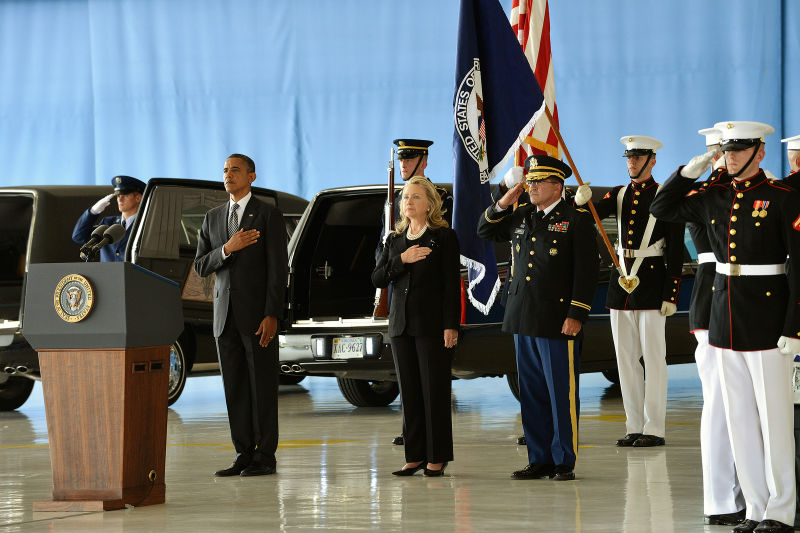Will Michael Bay’s film prove to be a political success for the Republican Party?
Director Michael Bay’s latest film, 13 Hours: The Secret Soldiers of Benghazi, has attracted the attention of the Republican Party, who view it as a condemnation of Hillary Clinton’s tenure as US secretary of state and the Obama administration’s handling of a terrorist attack on a US diplomatic outpost in Libya on September 11, 2012.
The film depicts an attack by numerous Ansar al-Sharia militants on a US diplomatic compound and, later, a covert Central Intelligence Agency (CIA) annex. Four Americans died during the twin attacks, including US Ambassador Chris Stevens and two former Navy SEALs-turned-CIA military contractors: Glen Doherty (played by Toby Stephens) and Tyrone Woods (played by James Dale).
Jumping on the Movie
Republican presidential hopefuls have encouraged Americans to see the film, believing it will demonstrate Clinton’s incompetence and dent her popularity in the run-up to November’s presidential election. Ted Cruz, for example, told Americans during a Republican presidential debate: “Tomorrow morning a new movie will debut about the incredible bravery of the men fighting for their lives in Benghazi, and the politicians that abandoned them.” Donald Trump even rented a cinema in Iowa to screen the film for free.
Indeed, a number of film critics have dismissed 13 Hours as GOP propaganda, suggesting that its timing before the Iowa Caucus and New Hampshire Primary was a deliberate ploy to increase the selection chances of Democratic candidate Bernie Sanders, who many Republicans regard as an easier opponent to face in the presidential elections.
There is some evidence to support the GOP’s propaganda thesis. 13 Hours certainly touches on the lack of security measures in place at the diplomatic compound, and the limited government response during the Benghazi attacks, which Republicans have suggested demonstrates the ineptitude of both Hillary Clinton and the Obama administration.
For example, the CIA military contractors portrayed in 13 Hours often note that the diplomatic outpost is highly insecure and easy to infiltrate, because “Uncle Sam is on a budget.” The film regularly labors the point that the US military failed to provide air support or gunships to assist the contractors during the Benghazi attack. Indeed, a House of Representatives Intelligence Committee report, and an independent panel appointed by the State Department, has confirmed that the US diplomatic outpost in Benghazi was poorly secured.
However, Republicans and those who claim the film is propaganda are missing the point of Michael Bay’s film. 13 Hours is not a criticism of Hillary Clinton or the Democrats, but a criticism of US government in general. The film is much more anti-establishment than it is anti-Obama. 13 Hours is largely an apolitical piece that focuses predominantly on the trials and tribulations of the individual American soldier, the difficulty in maintaining familial relationships during deployment, and the camaraderie that can form between individual soldiers in combat.
More importantly, 13 Hours emphasizes that these soldiers-turned-contractors have been let down by the political establishment and its stifling bureaucracy. While the film depicts a series of events that took place during a Democrat-led administration, the film is devoid of partisan politics, and Barack Obama, Hillary Clinton and the Democrats are not mentioned throughout the film.
Furthermore, the film often adopts a critical stance toward the upper echelons of the CIA, and in particular the CIA station chief, who is portrayed as an “East Coast-educated” authoritarian, whose obedience to bureaucratic convention delays the military contractors from leaving the CIA annex in order to save American lives.
In one of the opening scenes, one private contractor belittles an intelligence analyst’s Harvard education because he failed to realize that they were being tailed through the streets of Benghazi by suspected militants. Class dynamics run deep throughout the film, and by juxtaposing the ineffective and, at times, cowardly nature of the CIA analysts against the courageous, pragmatic and humble US soldier, Michael Bay is in many ways criticizing the very demographic of voters who are most likely to vote for the Republican Party.
Another nuance that Republicans have missed is that the film is largely an ode to isolationism, a tenet of US foreign policy that favors military restraint over military intervention—the latter of which Bay seems to regard as regularly, and unnecessarily, placing US soldiers in harm’s way.
Indeed, John Krasinski, who plays Jack Silva, muses that should he die, his daughters would think that “He died in a place that he didn’t need to be, over something he doesn’t understand, in a country that he didn’t care about.” At one point 13 Hours even transcends its focus on the plight of the US soldier via a poignant scene in which the mothers, wives and children of the Libyan militants killed during the attack mourn the loss of their loved ones.
It seems that Bay is suggesting that even the enemy’s death is a tragic consequence of US interventionism—and is avoidable. It is in this sense that Republican candidates have largely missed the film’s point. Most of the Republican presidential candidates are “hawkish” in nature and believe in the creation and maintenance of a strong US military, capable of exerting its influence within the international system. Indeed, a number of Republican candidates, including Donald Trump, support the notion of deploying ground troops to fight Daesh (Islamic State) in Syria and Iraq. The very type of interventionism that Bay’s film is criticizing suggests that this policy is harming US soldiers.
Bay has insisted that the film is apolitical, stating: “It’s not political. It’s a story of Americans who became heroes.” However, adherents of the GOP propaganda thesis have suggested that Bay has misrepresented the facts regarding the US military’s failure to provide air support, in order to damage Hillary Clinton’s campaign. Multiple Senate investigations have found that the nearest F-16’s in Aviano Air Base, Italy, were not combat ready, as they were trainers and would have taken 20 hours to reconfigure and prepare for combat. However, Bay omits these particularities, which might leave the viewer thinking the US military establishment was particularly neglectful and inept in its handling of the Benghazi attacks.
However, this is more likely to be a case of Bay exercising some “artistic license” rather than a partisan attack on Hillary Clinton and the Obama administration. Bay’s cinematic style is often fast-paced, favoring action shots over technical dialogue. Bay’s decision to leave out these details is most probably a reflection of this tendency, rather than a deliberate partisan attack.
Will 13 Hours affect Clinton’s campaign?
13 Hours will not harm Clinton’s campaign, but the politicization of the film might. The movie is not a piece of GOP propaganda, but the Republican Party and American conservative media seem to believe it is. Fox News, for example, has spent numerous airtime plugging the movie, including a special broadcast devoted to the film. Republicans are mobilizing this film in order to resurrect the controversy surrounding the Benghazi attacks, and to reinsert the idea that the Benghazi attacks were mishandled by the Obama administration and Clinton, into the national political conversation.
Those who watch the film having listened to Republican rhetoric are likely to view it through a politicized and partisan lens that was never supposed to be there. Whereas the uninformed viewer is unlikely to leave the film with any hard feelings toward Hillary Clinton or the Obama administration, but more toward government in general and an interventionist foreign policy that needlessly endangers US soldiers.
However, despite the Republican Party’s largely successful politicization of the film, there are a couple of reasons to believe that 13 Hours will have negligible consequences on the presidential election. First, the film has had limited successes, grossing just $16 million in its opening weekend. And, as of February 11, the film has grossed $49 million, meaning that it is likely to go unnoticed by the majority of Americans. Second, being a war film that focuses largely on soldierly heroism and that celebrates US militarism, it is likely that the key demographic watching the movie is already predisposed to voting Republican.
Indeed, Paramount Studios, the production company behind 13 Hours, has been deliberately promoting the film to the conservative crowd, with the film premier taking place in Republican stronghold, Dallas, Texas.
13 Hours is unlikely to impact the US presidential election, and Republican efforts to make the film political are more a sign of genuine concern about Hillary Clinton’s presidential chances than anything else.
The views expressed in this article are the author’s own and do not necessarily reflect Fair Observer’s editorial policy.
Photo Credit: Joseph Sohm / Shutterstock.com / US Department of State
 We bring you perspectives from around the world. Help us to inform and educate. Your donation is tax-deductible. Join over 400 people to become a donor or you could choose to be a sponsor.
We bring you perspectives from around the world. Help us to inform and educate. Your donation is tax-deductible. Join over 400 people to become a donor or you could choose to be a sponsor.
Support Fair Observer
We rely on your support for our independence, diversity and quality.
For more than 10 years, Fair Observer has been free, fair and independent. No billionaire owns us, no advertisers control us. We are a reader-supported nonprofit. Unlike many other publications, we keep our content free for readers regardless of where they live or whether they can afford to pay. We have no paywalls and no ads.
In the post-truth era of fake news, echo chambers and filter bubbles, we publish a plurality of perspectives from around the world. Anyone can publish with us, but everyone goes through a rigorous editorial process. So, you get fact-checked, well-reasoned content instead of noise.
We publish 2,500+ voices from 90+ countries. We also conduct education and training programs
on subjects ranging from digital media and journalism to writing and critical thinking. This
doesn’t come cheap. Servers, editors, trainers and web developers cost
money.
Please consider supporting us on a regular basis as a recurring donor or a
sustaining member.
Will you support FO’s journalism?
We rely on your support for our independence, diversity and quality.







